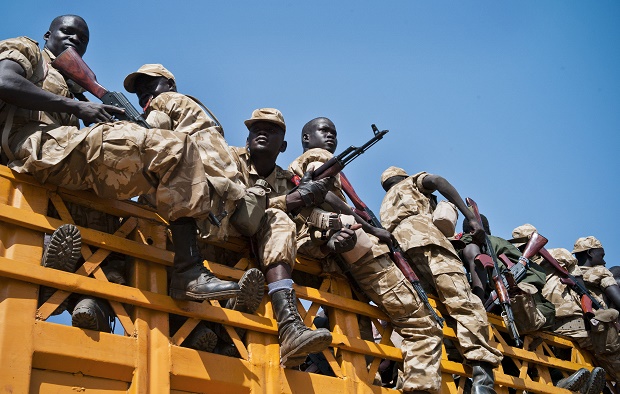
In this Monday, Jan. 13, 2014 file photo, some of hundreds of government soldiers board trucks and pickups, to head to the frontlines to reinforce other government forces already fighting rebel forces near the town of Bor, as they prepare to leave from the outskirts of Juba, South Sudan. A long-awaited report by African Union investigators, released lated Tuesday, Oct. 27th, 2015 says mass graves have been discovered in South Sudan, cites horrific crimes against civilians including forced cannibalism, and disputes that there was a coup attempt by former Vice President Riek Machar in December 2013, finding that the conflict began with a skirmish between members of the presidential guard in the capital Juba. AP FILE PHOTO
UNITED NATIONS — A United Nations panel of experts says both sides in South Sudan’s conflict are expanding their weapons stockpiles and violating a peace deal. But the UN Security Council is not moving forward with the arms embargo and sanctions it has repeatedly threatened for such actions.
A monthly panel of experts report dated Monday and obtained by The Associated Press says both sides in oil-rich South Sudan are “persistently failing to implement a permanent ceasefire” and maintain security arrangements meant to help set up a transitional government.
But the current Security Council president emerged from a South Sudan briefing Wednesday to tell reporters that council members have a “range of views” on taking punitive action.
READ: UN threatens sanctions if South Sudan peace deal isn’t kept
A Russian diplomat told reporters that actions such as an arms embargo would not help the peace process. “What we need is more patience and engagement, not trying to punish them,” deputy UN ambassador Petr Iliichev said.
Iliichev said the report of growing weapons stockpiles only shows that there is “huge mistrust.”
Tens of thousands of people have been killed in South Sudan since December 2013, when government forces loyal to South Sudan President Salva Kiir began fighting rebels led by his former deputy, Riek Machar. The two sides signed a peace deal in August, but fighting continues.
The panel of experts report says Kiir in October “unequivocally undermined” the power-sharing formula that underlies the peace agreement by increasing the number of states in the country from 10 to 28 and saying the governors of the new states would be appointed by him.
The report also says the humanitarian situation in South Sudan continues to get worse, “with 3.9 million people nationwide now facing severe food insecurity.”
British Ambassador Matthew Rycroft, the current council president, said the 15 council members agreed to express “deep concern” about the ongoing fighting and urge the peace agreement’s immediate implementation.